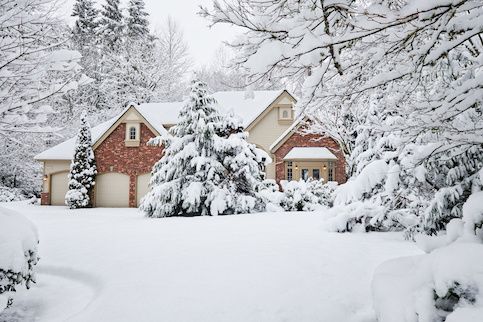Buying a home can be a long, drawn-out process. By the time closing comes around, you usually don’t have to do much besides sign a few documents and get your keys. But what happens if financing falls through on a house on closing day – just when you thought you had it all under control?
It’s disappointing – to say the least – but sometimes these things happen. Fortunately, there are ways to safeguard yourself from problems that can come up with final loan approval.
Preapproval And Approval Aren’t The Same Things
Getting preapproved for a loan is one step toward financing your future home, but it’s not the last step. After you submit a mortgage application, a lender will conduct a credit check and review your finances and credit history to verify you can afford a home loan and preapprove you. Borrowers usually take this step before they start house hunting so they already know how much home they can afford.
Because many sellers want some reassurance that they’re dealing with a serious home buyer, they may even request a preapproval letter before moving forward with negotiations. Without a preapproval letter, many sellers may mistakenly assume you’re just casually shopping for homes.
Final loan approval happens after you’ve found the home you want.
Once a seller accepts your purchase offer, you’ll finish up the mortgage application process, typically involving an appraisal and inspection for final loan approval. While preapproval can increase your chances of getting approved – it’s not a guarantee.
What’s Your Goal?
Buy A Home
Discover mortgage options that fit your unique financial needs.

Refinance
Refinance your mortgage to have more money for what matters.
Tap Into Equity
Use your home’s equity and unlock cash to achieve your goals.
Common Reasons Home Loans Fall Through
Mortgage approvals can fall through on closing day for a wide range of reasons, such as not acquiring the proper financing, appraisal or inspection issues or contract contingencies that weren’t satisfied or violated.
Issues Related To Obtaining Financing
Financing is one of the most crucial factors for securing final mortgage approval. Below are two instances where you may run into issues with financing.
You Made A Big Purchase With Credit
Once you’ve been preapproved, it is crucial to avoid large purchases. The last thing you should do is rack up hundreds or thousands of dollars in purchases on your credit cards before your loan is approved. Big purchases are red flags for lenders. They may see you as more of a risk because you’re collecting more debt.
Depending on your lender and financial situation, you may need to cap any credit card spending to no more than $300 or $500. You should also ask your Realtor or mortgage lender what amount could jeopardize loan approval.
You Applied For More Credit
If you bought a new car or applied for another credit card, this can worry lenders. Applying for more credit causes your credit score to dip, which could translate to a higher interest rate or your lender denying your loan. Try holding off on any activities or purchases that would cause your credit score to drop until after closing.
Issues Related To The Appraisal
If your lender isn’t satisfied with the result of the home appraisal, they may deny your loan. An appraisal that comes in lower than the home’s asking price could hold up the underwriting process. A lender won’t approve a loan for more than a home’s appraised market value.
Issues Related To The Home Inspection
A home inspection will outline the major (and minor) issues with a home. How those concerns are addressed will impact your ability to move toward closing.
The deal might fall through if the buyer and seller can’t agree on who handles the problems that show up during the inspection. While some sellers may want to sell the home as-is to expedite the sale, buyers may hesitate to be on the hook for significant problems in the house.
For instance, if an inspection shows that the roof needs replacing, a seller may not want to invest in replacing the roof before the sale. An aging, leaky roof could be reason enough for a deal to fall through.
An inspector may uncover toxic mold or lead paint, especially with older homes that haven’t been upgraded. While the buyer knows what’s wrong and can avoid buying a home with structural issues or health hazards, it also means the mortgage may fall through at the last minute.
Issues Related To The Title Or Deed
As your lender continues the loan approval process, they’ll order a title search on the home. A property title verifies who owns the property and their right to sell it. A property title search also involves searching for any outstanding liens, deed restrictions or claims on the property. The seller must settle any outstanding liens or claims before they can sell the home.
The results of a property title search can cause closing delays if it finds debts to contractors who worked on the home, outstanding taxes, child support liens or bankruptcies. If a buyer runs into a title search issue, it could derail the deal.
Ready To Become A Homeowner?
Get matched with a lender that can help you find the right mortgage.
What To Do If Your Mortgage Application Is In Jeopardy
One of the best things you can do to avoid mortgage delays or loan denial is to ensure that what you can control concerning your finances is in order.
- Make a larger down payment: If the home appraises for less than the asking price, you can increase your down payment to cover the shortfall between the asking price and the appraised value. You could also try another bank or mortgage lender, but that may result in even more delays.
- Request a lower asking price: If the appraisal comes in too low, consider asking the seller to lower the asking price. In a hot housing market, some home buyers’ only option will be to make up the difference in cash. But if you’re the only bidder to make it this far, the seller might be more flexible about the sale price.
- Resolve inspection issues: If issues uncovered during the inspection have complicated mortgage approval, there are a few solutions to consider. You can agree to handle the repairs yourself once you buy the home. Another option would be to have the seller fix the problems before anything moves forward. The mortgage may fall through if you and the seller can’t agree on who will handle the repairs.
Take The First Step To Buying A Home
Find a lender that will work with your unique financial situation.
What To Do If Your Mortgage Is Denied
When you get so close to the finish line, it can be challenging to restart the process. But if homeownership is an accomplishment you’re committed to achieving, consider these next steps:
- Find a new home: You’ll need to put the house you were in love with in the rearview mirror and move on to the next. Find a few new options you really like, or reconsider some properties you’ve already seen.
- Shop for less expensive homes: Just because you’re preapproved for a specific amount doesn’t mean you should spend it all. Find a home you can comfortably afford. The less money you borrow, the more money you’ll likely have to put toward your down payment and lower your monthly mortgage payments.
- Find a new lender: You’re not obligated to stay with the same lender. Shop around to compare lenders and loan terms, such as interest rates, repayment terms and fees. The more lenders you compare upfront, the more likely you’ll find one that fits your needs.
- Take some time off: Sometimes moving forward requires stepping back. You may need a break from house hunting to build up your credit score, save more for a down payment or start browsing homes in a new area. Wanting to be a homeowner right now doesn’t always make it the right time to buy a home.
Review your finances and talk to your real estate agent before deciding what to do next.
What To Do If Your Mortgage Falls Through: FAQs
Have more questions? We’ve got answers to some frequently asked questions about mortgages falling through on closing day.
– Large purchases
– Sudden job changes
-Opening new credit accounts
– Not resolving inspection issues
– Avoid these mistakes to boost your chances of closing on a new home.
6% of housing contracts from the previous 3 months were terminated.
11% of housing contracts from the previous 3 months were delayed.
Over half the delays were the result of appraisal issues.
Based on these numbers, over 80% of home sales successfully close.
The Bottom Line
Mortgage woes can happen, and you can do what’s under your control to avoid them. If your mortgage falls through, take a little time to figure out what went wrong and whether it could’ve been prevented. If they were preventable, consider what you can do to avoid these pitfalls in the future.
Use the resources you have before you ever get to closing day. Buying a home will likely be the most expensive purchase you ever make. Try to be as prepared for it as you can be.

Dori Zinn
Dori Zinn has been a personal finance journalist for more than a decade. She loves helping people learn about money, covering topics like credit, debt, investing, banking, real estate, jobs and careers, budgeting, college affordability, financial literacy, borrowing and more. Her work has been featured in CNET, Wirecutter, Quartz, Forbes, Bankrate, Credit Karma and others.












